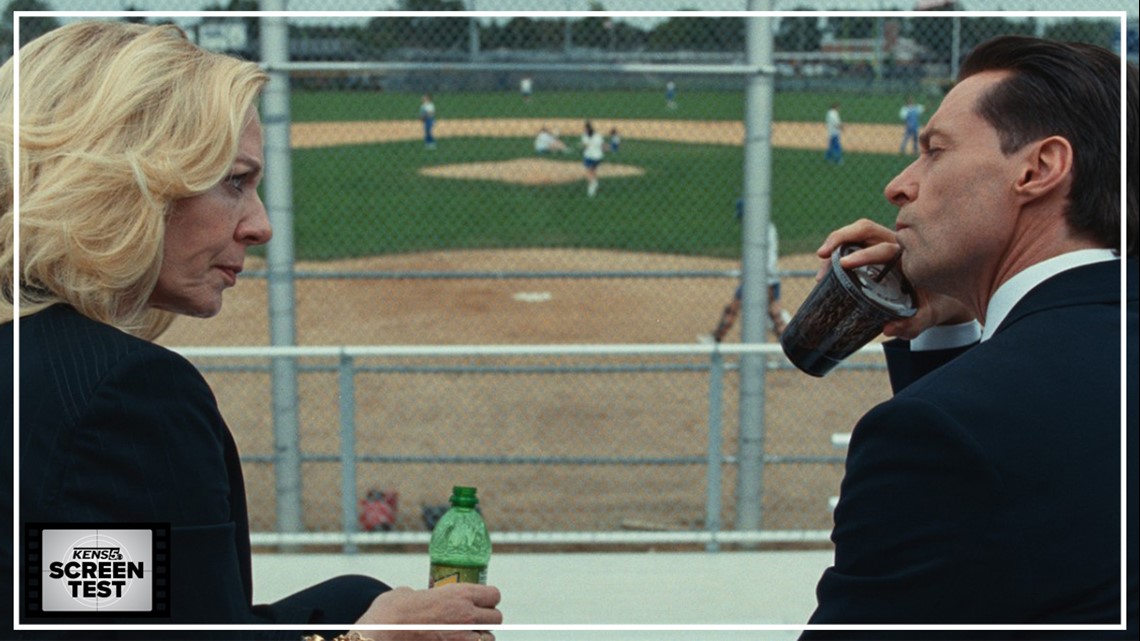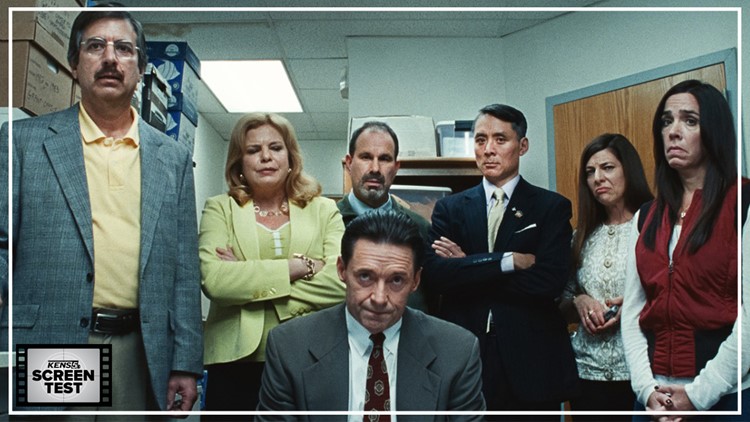There’s a solid chance you’ll be reminded of yesteryear’s college admissions bribery scandal – and the strange swirl of unbelievability, irony and contempt that came with it – when watching Cory Finley’s exceptionally nuanced “Bad Education,” which premieres on HBO Saturday night. Some familiar questions might also resurrect themselves as the real-life history of embezzlement by Hugh Jackman’s corrupt Long Island school administrator is uncovered (don’t worry—that’s not a spoiler so much as the “how” and “what’s next”) in a community where affluence is practically the high school mascot. How could they even consider this? Haven’t they got it easy enough? What’s the end game?
The answers aren’t so simple. And the parts of the story that are even less simple is what Finley and screenwriter Mike Makowsky are interested in—the ethical thicket that leads people like William Singer, Lori Loughlin and Jackman’s Frank Tassone to take advantage of systems that are practically begging to be taken advantage of. “Bad Education” is a white-collar caper loaded with moral ambiguity – though the film itself isn’t morally ambiguous – lifted up by marvelous performances and powered by a surprising amount of thematic depth that makes Finley’s “Thoroughbreds” follow-up as enticing to pick apart as it is satisfying to watch. The dollar amount of Frank’s misdeeds numbered in the millions, but that figure isn’t the end-all, be-all as you’d normally expect from these stories.
While there’s no telling this true-blue tale without including the bravura act of high school journalism that accelerated it, “Bad Education’s” decision to focus on the supposed antagonists makes for an intriguing narrative swerve that pays off in spades—in the process making them seem less like mustache-twiddling villains and more like complicated humans with more at stake than a career.
Against a steely visual palette and Michael Abels’s mischievous-sounding score, our first impressions of the clean-cut Frank Tassone are of a successful superintendent who has collected straight As in his short time at the helm. Forget about embezzlement; there’s hardly a hint of nefarious activity as we see him generously interacting with concerned parents and being treated as an idol by students just as much as by colleagues.
All the while there’s recurring talk of “getting to No. 1”…of what exactly? It’s never explicitly explained, and it doesn’t matter. The pursuit of a peak ranking feels part and parcel with Tassone’s persona, and it will remain as such when everything comes crashing down.
Finley’s doesn’t orchestrate his sequences with dour self-seriousness, though, or self-righteousness. In traversing this landscape of ne’er-do-well New Yorkers, “Bad Education” is rather sprightly – there’s some Soderberghian energy here – and a deadpan tone enhances its surly wit just as efficiently as it provides Jackman a springboard for some career-best work. “I would kill for a carb,” Frank says early on to his second-in-command, Pam Gluckin (Allison Janney, characteristically triumphant thanks to trademark sarcasm). The comment feels as much like a meta-comment on his time as the chiseled Wolverine as it is an indication of desires that aren’t as public as his triumphs.
As burgeoning student reporter Rachel (Geraldine Viswanathan) begins pursuing suspicions rooted in an exorbitantly-priced “sky bridge” that Frank and Pam are touting, the movie’s narrative (and coherent) practicality doesn’t hog the character-focused approach. There’s a steady pulse as truths are revealed, but the main event is the thoughtful consideration given to the psychology of those found at fault for fraud—and the reactions of a privileged family who have grown accustomed to giving themselves a leg up solely because they can. Complicity doesn’t overlap with criminality, certainly not in the way we’d expect.


It’s an expert choice on the part of “Bad Education” not to inundate the viewer with an overwhelming syllabus of statistical specifics. Instead, nuanced observation of character flaws and secret lives sets the movie apart. At the same time, Makowsky’s screenplay injects underlying commentary on educators’ low salaries and the sociolegal attitudes of domestic partnerships still viewed as unaccepted in the early-2000s (and perhaps today, in some circles) with finesse as Finley manages to walk a tonal tightrope.
“Bad Education” doesn’t demand sympathy for the characters that Janney and Jackman play so well, but it excels at illuminating the grey areas, at asking the viewer to question the larger societal trappings in which they operated. Schemes aren’t the name of the game in this drama as much as opportunism is, and as Jackman’s exceptionally devilish performance patiently de-evolves from the raise of an eyebrow to furrowed brow and direct threat, he comes to bear equal doses of desperation and deviance.
You can almost see justification peeking through. As the walls – and Rachel – close in on Frank and the realization dawns that being so close to that coveted No. 1 spot won’t serve as armor, Jackman displays mixed shades of good intentions and sly culpability. In a funny turn of events, the actor might very well be proving that he can thrive on these sort of antihero roles in the post-superhero leg of his career. In “Bad Education,” his smile is as sharp as adamantium claws.
"Bad Education" is not rated. It premieres Saturday night on HBO, before moving onto streaming.
Starring: Hugh Jackman, Allison Janney, Alex Wolff, Geraldine Viswanathan
Directed by Cory Finley
2020



